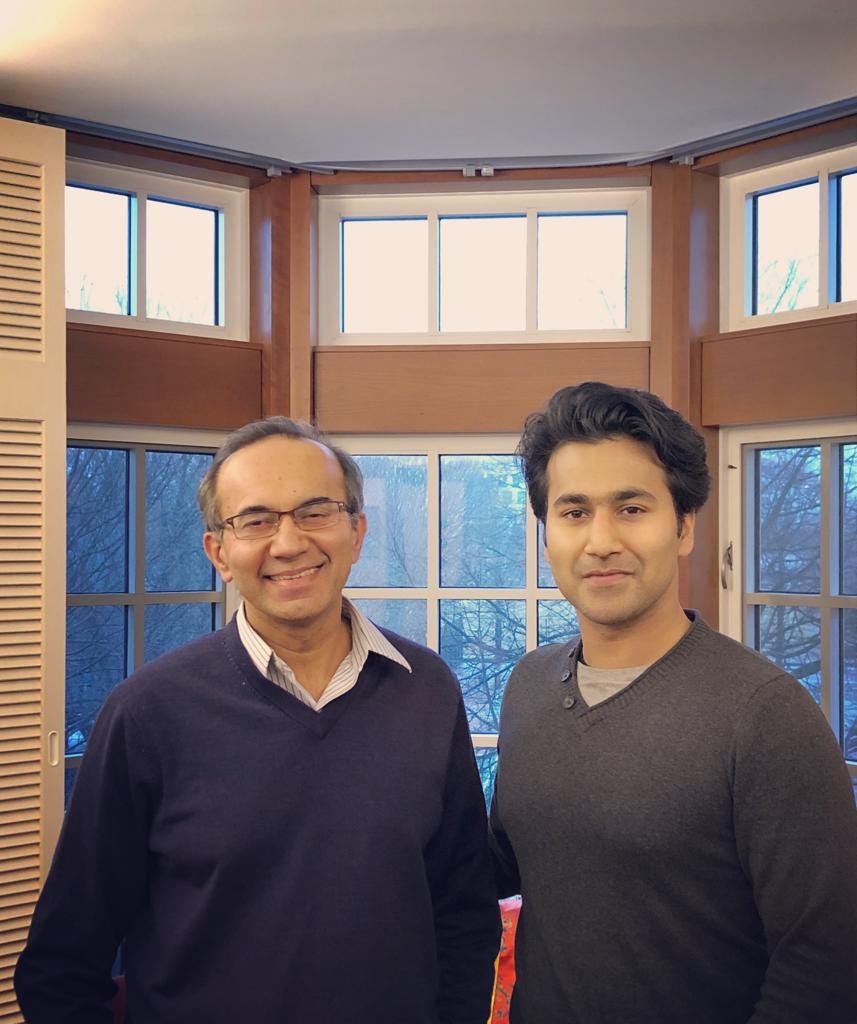Harvard Business School Professor Tarun Khanna and India
Shaping India with policies, ideas, and capital
Before we get started, here are a few reminders.
Pramath Raj Sinha and Utkarsh will be unpacking edtech in India on August 21
Learn tech strategy and career principles from Wharton and McKinsey alumnus Prerak Garg
I first met Tarun during my time at Wharton in 2013. He was speaking at The India Conference at the Penn Law School. I took furious notes during his presentation and we shared a glass of wine after. Since then we have kept in touch and met a few times at the World Economic Forum, Delhi, Boston, and London.
I read the Aadhar case study he wrote shortly after I joined Microsoft and sent the takeaways to some of the senior leaders at the company. That case study formed the basis of a number of projects on India Stack.
A few years after when Network Capital partnered with NITI Aayog for Atal Innovation Mission, I learned that he was the one who conceptualized the idea along with senior ministers. His insight was simple: In order to bridge the talent-opportunity mismatch in India, we need to bring the boardroom and the classroom closer (that’s the foundation of the Mentor India movement), have a curriculum that sparks a sense of wonder among students and shifts focus from “what” to “why”, and engineer sufficient policy support to translate the vision into something actionable.
Tarun’s student Naveen Tiwari built InMobi. He is also the co-founder of Chai Point along with his student Amuleek Bijral. The entire list of the companies he helped get started and invested in would be beyond the scope of this newsletter, but his role in scaling entrepreneurship transcends Harvard Business School.
The founding thesis of Atal Innovation Mission is that you can build for India in India. An elite business degree is not a precondition. A new mindset toward learning and a fundamentally different approach toward education can democratize entrepreneurship. While it is still early to celebrate success, the 7.5 million school students part of the Atal Innovation Mission is likely to create future changemakers in the country.
Perhaps exploring the structural barriers to entrepreneurship prompted him to write the book on meritocracy and contrast the difference in the contextual subtleties across India, China, and the rest of the world. While I have read extensively about meritocracy and talent in Oxford, Tarun’s work helped me contextualize it for Network Capital. Meritocracy works to a certain extent but it is far from perfect. Merit needs to be understood in the broader context and complex issues like access, opportunity and other systemic factors need to be weighed in.
When we think about institution-building and entrepreneurship in emerging markets like India, the geometry of trust needs to be understood, contextualized, and scaled to get stuff done. It is not a linear process. Tarun’s book on trust explains it with the help of case studies and practical frameworks that are relevant to anyone interested in appreciating the complexity of doing business in India.
While he spends a chunk of his time with entrepreneurs, students, and young startups, a large body of his work deals with the kind of leadership that lasts generations. As a young startup founder, I found his research on family businesses across the world particularly revealing.
Working with other important institution builders, policymakers, and entrepreneurs for over three decades has resulted in Tarun having one of the strongest networks in India and perhaps globally. I don’t know for sure but I think he can pretty much pick up the phone and call anyone to discuss ideas worth paying attention to.
So what did he do with all this? He built (along with his friend and colleague Karim Lakhani) Aspire Institute, a mission-driven organization that aims to transform the lives of first-generation learners worldwide who are currently underserved, through a fully funded leadership development program that catalyzes our leaders of tomorrow to make a positive impact in their communities.
Why am I telling you all this?
Relationships take a while to build and evolve into something meaningful. We bonded through our shared love for ideas and that forms the basis of our friendship. Approaching people with an agenda may not always be the right way.
Portfolio of careers work. Tarun is an academic, entrepreneur, investor, writer, and institution builder. He doesn’t have five jobs. He has aligned his work life in a way that his interests manifest in different ways. Pursuing multiple interests doesn’t mean a lack of focus. With the right mindset and with the right timing, we can make our multiple interests and curiosities work for us. I would caution you against feeling pressured to do the same thing. Do it if you feel it makes sense for you. Just keep in mind it can be done.
Bundle your curiosities. Tarun is passionate about India. Many people share this passion but they struggle to do anything tangible about it. Why? Because it is daunting to start. It is a huge country where every truth is marked with an equally strong contradiction. The only way to make sense of it and have a sense of ownership around it is to have your interests guided by a few overarching questions. Then bundle your curiosities in a way that can make a small dent in the universe. Remember you can do anything you want but you will probably struggle to do everything you want when you want. Timing matters. There are periods when you need to focus on one thing for years on end, and then there are periods when you reap the rewards of your effort in the form of new opportunities.
Learn to say no kindly. Tarun has said no to many life-changing opportunities. One left me flabbergasted. I thought no one could have declined that but then he did. Relatively early in his career. Say no with empathy is perhaps what created enough head space for him to do the work he wanted.
Time is elastic. Three sub-points here:
a. Parkinson’s law: Work expands to fill the time allotted for its completion.
b. If you repeatedly don’t find time for something, it is not a priority.
c. This poster I found online
Mentors matter. I don’t need to say more. Let the first video we ever recorded speak for itself.
Have a great day ahead. Take time to nourish friendships that matter.
Utkarsh
P.S. You will enjoy reading Tarun’s newsletter.



